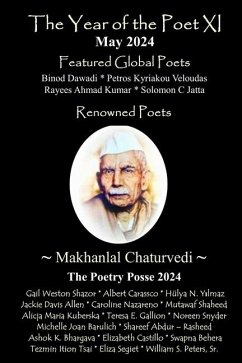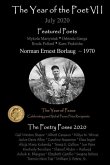Foreword Renowned Poets: Makhanlal Chaturvedi "I don't wish to be adorned as an ornament of a beautiful bride I have no craving to be a gift presented to the beloved, I don't cherish to be placed on the casket or grave of great kings, I never desire to be on the heads of the idols of Gods, dear gardener rather pluck me and be throw me on the road >"A flower's wishes" by Makhanlal Chatturvedi The above stanza is the translated version of the famous Hindi poem PUSHPA KI ABHILASHA written by Padma Bhusan Pandit Makhan Lal Chaturvedi. In this poem he expresses his feelings for his nation through a flower. The personified flower says that it is not preferable to become a garland of a beloved or to adorn the hair of beautiful women or be offered to God or on the funeral of great kings. The only wish the flower is to lie on the path on which brave soldiers pass to sacrifice their lives for the nation. 'A Flower's Wishes' is written in the Bilaspur prison, situated in present-day Chhattisgarh, was an allegorical poetry representing the nation's spirit of freedom and selfless sacrifice. Pandit Makhan Lal Chaturvedi, was an Indian poet, writer, essayist, playwright and a journalist who is particularly remembered for his participation in India's national struggle for independence and his contribution to Chhayavaad and the Neo-romanticism movement of Hindi literature. He has taken an active part in the Non-Cooperation Movement and was jailed in 1921. His literature showed his intense desire for India's freedom from British rule. His famous poems are "I am afraid of myself", The prisoner and the Nightingale", 'Climbing the mountain slowly" "Air," "Boon or curse", "youth", 'Immortal Nation" "Let me cry" what do you sing? Why do you keep going? the cuckoo speak up! What do you bring? >- the soldier and the cuckoo - Pandit Makhanlal Chaturvedi (4 April 1889 - 30 January 1968), was an Indian poet and editor famous for his works such as Venu Lo Gunje Dhara, Him Kirtini Him Tarangini, Yug Charan, Sahitya Devata, etc. He was born in in a Babai [Makhan Nagar] village of Narmadapuram district of Madhya Pradesh in India on 4 April 1889. He is a writer, essayist, playwright and a journalist who is particularly remembered for his participation in India's national struggle for Independence and his contribution to the Neo Romanticism movement of Hindi literature, known as Chhayavaad. Indian language went through a nationwide phase of romantic writing in the period between the two World Wars (1920 -1935). This phase overlapped with the nationalist movement Chhayavaad, He became a school teacher at the age of sixteen. Later he was the editor of the nationalist journals Prabha, Pratap and Karmaveer, and was repeatedly incarcerated during the British Raj. His noted works in Hindi are Him Kirtini, Him Tarangini, Yug Charan, and Sahitya Devata, and his most noted poems are Venu Lo Gunje Dhara, Deep Se Deep Jale, Kaisa Chhand Banaa Deti hai, Agnipath and Pushp ki Abhilaashaa [...] Long live global peace .... Swapna Behera Cultural Ambassador of India and South East Asia for Inner Child Press International.
Bitte wählen Sie Ihr Anliegen aus.
Rechnungen
Retourenschein anfordern
Bestellstatus
Storno


